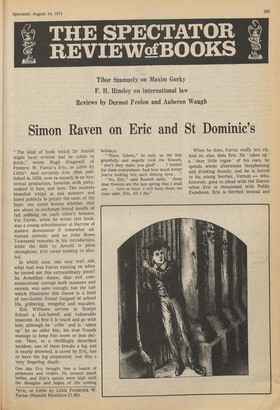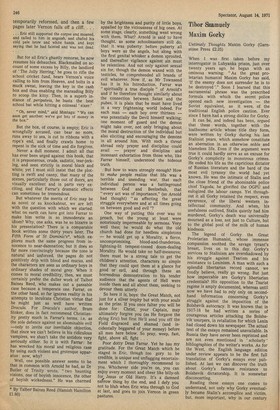Simon Raven on Eric and St Dominic's
"The kind of book which Dr Arnold might have written had he taken to drink," wrote Hugh Kingsmill of Frederic W. Farrar's Eric, or Little by Little*. And certainly Eric (first published in 1858, now re-issued) is an hysterical production, feverish with piety, soaked in hate and love. The masters brandish whip; at one moment and kneel publicly in prayer the next; of the boys, one never knows whether they are about to exchange brutal insults or fall sobbing on each other's bosoms. Yet Farrer, when he wrote this book, was a young schoolmaster at Harrow of austere demeanour if somewhat advanced notions; and as John Rowe Townsend remarks in his introduction, while the debt to Arnold is plain throughout, Eric owed nothing to alcohol.
In which case, one may well ask, what fuel was Farrar running on when he turned out this extraordinary piece? Its Arnoldian theme, that evil communications corrupt both manners and morals, was sane enough; but the tale which illustrates this theme is a kind of neo-Gothic Grand Guignol of school life, gibbering, vengeful and macabre.
Eric Williams arrives at Roslyn School a fair-haired and vulnerable innocent. At first it is touch and go with him; although he 'cribs' and is taken up' by an older boy, his true friends manage to keep him more or less decent. Then, in a thrillingly described incident, one of them breaks a leg and is nearly drowned, is saved by Eric, has to have the leg amputated, and dies a very lingering death :
One day Eric brought him a bunch of primroses and violets. He seemed much better, and Eric's spirits were high with the thoughts and hopes of the coming holidays.
"There, Edwin," he said, as the boy gratefully and eagerly took the flowers, "don't they make you glad? . . . I hunted for them everywhere. And how much better you're looking too; such shining eyes...."
"No, Eric," said Russell sadly, " these dear flowers are the last spring that I shall see . . . here at least. I will keep them, for your sake, Eric, till I die."
When he does, Farrar really lets rip. And so, alas, does Eric. He 'takes up' a 'dear little rogue' of his own, he spends whole afternoons blaspheming and drinking brandy, and he is horrid to his young brother, Vernon — who, however, goes to plead with the Doctor when Eric is threatened with Public Expulsion. Eric is birched instead and temporarily reformed, and then a few pages later Vernon falls off a cliff. . . .
... Eric still supported the corpse and moaned, and called to him in anguish, and chafed his cold pale brow and white hands, and kept saying that he had fainted and was not dead.
. .
But for all Eric's ghastly remorse, he now resumes his debauches. Blackmailed on account of some excess by Billy, the landlord of 'The Jolly Herring,' he goes to rifle the school cricket fund, hears Vernon's voice calling to him from Heaven, and bolts in a muck sweat, leaving the key in the cash box and thus enabling the marauding Billy to scoop the kitty. Then, in a superb instance of peripateia, he busts the best school bat while hitting a colossal ' sixer.'
"Oh, never mind," said Montagu: "We can soon get another; we've got lots of money in the box."
But the box, of course, is empty; Eric is wrongfully accused, can bear no more, runs away to sea, is cut to ribbons with a rope's end, and finally crawls home to repent in the nick of time and die forgiven.
Never a dull moment. I admit all that has ever been urged against this book, that it is preposterous, crude, sadistic, tear-jerking, and seen strictly in moral black and white; yet I must still insist that the plotting is swift and canny, that many of the scenes, particularly those out of doors, are visually excellent and in parts very exciting, and that Farrar's dramatic effects can sometimes be tremendous.
But whatever the merits of Eric may be as novel or as knockabout, we are left with the question with which we started: what on earth can have got into Farrar to make him write in so immoderate an idiom? Why, one asks, was he so bizarre in his presentation? There is a comparable book written some thirty years later, The Fifth Form at St Dominic's*, which explores much the same progress from innocence to near-damnation; but it does so far more convincingly because the tone is natural and unforced, the pages do not positively drip with blood and mucus, and the characters are seen as ordinary boys in ordinary shades of moral grey. When it comes to moral credibility, then, we must certainly prefer the duller work of Talbot Baines Reed, who makes out a passable case because a temperate one. Farrar, on the other hand, so far ignores reality in his attempts to inculcate Christian virtue that he might just as well have written Dracula. For Dracula's author, Bram Stoker, does in fact recommend Christianity pretty much in Farrar's terms, i.e. as the sole defence against an abominable evil —only to invite our inevitable objection, that since we can't believe in his ridiculous vampires, we shan't take the antidote very seriously either. So it is with Farrar : he has wrecked his moral and religious case by using such violent and grotesque apparatus: now, why?
Well, one possible answer seems to be that in common with Arnold he had, as Dr Butler of Trinity wrote, "two haunting visions, one of boyish innocence, the other of boyish wickedness." He was charmed by the brightness and purity of little boys, appalled by the viciousness of big ones. At some stage, clearly, something went wrong with them. What? Arnold is said to have thought, as some schoolmasters still do, that it was puberty: before puberty all boys were as the angels, but along with the first genital whisker a demon sprouted, and thereafter vigilance against sin must be relentless. And not only against sexual sin for, though the demon waxed with the testicles, he comprehended all brands of evil whatever. Now if, as Mr Townsend has it in his Introduction, Farrar was " spiritually a true disciple " of Arnold's and if he therefore thought similarly about the connection between Satan and the pubes, it is plain that he must have lived in a very frightening world indeed. For each man — each boy over thirteen — was potentially the Devil himself walking; one moment off guard and the demon might take over, not only bringing about the moral destruction of the individual but also eliciting and encouraging the demons in all around him. With such a threat abroad only prayer and discipline could avail — prayer and discipline and incessant exhortation from those who, like Farrar himself, understood the hideous truth.
But how to warn strongly enough? How to make people realize that life was a terrible and unending war, that each individual person was a battleground between God and Beelzebub, that "every act was of importance," (so Arnold had thought) "as affecting the great struggle everywhere and at all times going on between good and evil "?
One way of putting this over was to preach, but the young at least were notoriously impermeable by sermons. Very well then; he would do what the old church had done for heedless simpletons — he would get up a Morality, a fierce, uncompromising, blood-and-thunderous, lightning-lit tempest-tossed doom-dealing Morality. He would take no half-measures; there must be a strong tale to get the children's attention, characters so simple that they could spot them at a glance for good or ewil, and through these an horrendous demonstration to his tender audience that the agents of Hell were inside them and all about them, seeking to devour them utterly.
So here it is, boys: the Great Match, not just for a silver trophy but with your souls as the prize. If you once falter you will be done for : Christ, your Captain, may ultimately forgive you (as He forgave the dying Eric) but first He'll send you off the Field disgraced and shamed (and incidentally beggared of your money) before all men here below. So pray, weep, fast, fight, above all, fight . . .
Poor dotty Dean Farrar. Yet he has my gratitude. For the Great Match which he staged in Eric, though too gory to be credible, is unique and unflagging entertainment which I thoroughly recommend to you. Whichever side you're on, you can enjoy every moment and cheer like billy-oh for Jesus or Old Harry. It's a damned nac'row thing by the end, and I defy you not to blub when Eric wins through to God at last, and goes to join Vernon in green pastures.



































 Previous page
Previous page